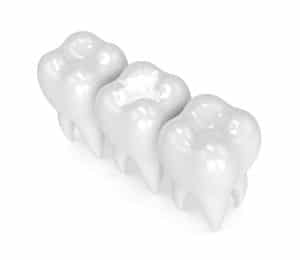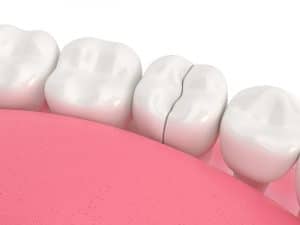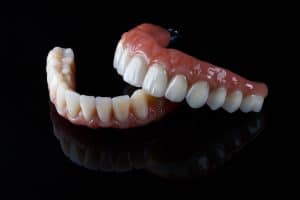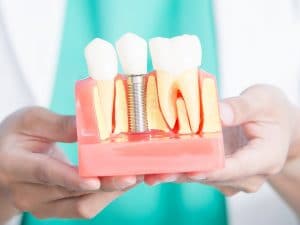 Practicing consistent oral health habits such as routine brushing and flossing, in addition to attending regular examinations and cleanings are the ideal way to keep your smile in tip-top condition, but what do you do when something unexpected occurs? Accidents can happen at any given moment and cause harm to your teeth, such as cracks, chips, and more. At Dreem Dentistry in Leawood, Kansas, we want our patients to know that restorative options are available, such as receiving a dental crown, that could very well save your smile.
Practicing consistent oral health habits such as routine brushing and flossing, in addition to attending regular examinations and cleanings are the ideal way to keep your smile in tip-top condition, but what do you do when something unexpected occurs? Accidents can happen at any given moment and cause harm to your teeth, such as cracks, chips, and more. At Dreem Dentistry in Leawood, Kansas, we want our patients to know that restorative options are available, such as receiving a dental crown, that could very well save your smile.
How We Can Cosmetically Enhance Your Smile
 Your smile’s appearance is affected by a myriad of factors – from the foods you eat to the beverages you ingest, and even to the activities you participate in. While you may take care to practice good oral health habits to prevent this, the fact of the matter is that over time, it is natural for teeth to lose their shine. With all of this in mind, naturally, your smile will begin to fade and even change color, from a shiny white to a muted yellow or worse. Fortunately, the team at Dreem Dentistry in Leawood, Kansas has a solution for you that is quick, efficient, and can restore the shine you are looking for.
Your smile’s appearance is affected by a myriad of factors – from the foods you eat to the beverages you ingest, and even to the activities you participate in. While you may take care to practice good oral health habits to prevent this, the fact of the matter is that over time, it is natural for teeth to lose their shine. With all of this in mind, naturally, your smile will begin to fade and even change color, from a shiny white to a muted yellow or worse. Fortunately, the team at Dreem Dentistry in Leawood, Kansas has a solution for you that is quick, efficient, and can restore the shine you are looking for.
The Benefits of Attending Your Routine Check-Up
 Our day-to-day lives can become hectic very fast, especially in the wake of the Coronavirus. What seemed like a consistent and never-ending list of to-dos now requires much more planning and energy to accomplish, rendering us exhausted and forced to cut out things that we can put off until later. While this may appear the case for doctor appointments and dental check-ups, it is crucial now more than ever to prioritize them. At Dreem Dentistry in Leawood, Kansas, oral health is our priority, and not skipping out on routine examinations and cleanings is the first step to a healthier, happier smile.
Our day-to-day lives can become hectic very fast, especially in the wake of the Coronavirus. What seemed like a consistent and never-ending list of to-dos now requires much more planning and energy to accomplish, rendering us exhausted and forced to cut out things that we can put off until later. While this may appear the case for doctor appointments and dental check-ups, it is crucial now more than ever to prioritize them. At Dreem Dentistry in Leawood, Kansas, oral health is our priority, and not skipping out on routine examinations and cleanings is the first step to a healthier, happier smile.
How Getting a Cavity Filled Can Protect You from Disease
 As one of the most common dental concerns out there, cavities should not go untreated. At times they can be difficult to spot with the naked eye, however, attending routine check-ups and examinations can help you identify any concerns or threats to your smile while also offering solutions as to how to prevent them. If left unaddressed, that cavity can get worse, even leading to tooth loss. Fortunately, blemishes such as these are relatively simple to fix with a filling, and our Leawood, Kansas Dentist at Dreem Dentistry can let you know just how helpful this procedure can be for your oral health.
As one of the most common dental concerns out there, cavities should not go untreated. At times they can be difficult to spot with the naked eye, however, attending routine check-ups and examinations can help you identify any concerns or threats to your smile while also offering solutions as to how to prevent them. If left unaddressed, that cavity can get worse, even leading to tooth loss. Fortunately, blemishes such as these are relatively simple to fix with a filling, and our Leawood, Kansas Dentist at Dreem Dentistry can let you know just how helpful this procedure can be for your oral health.
How Bonding and Contouring Restores Your Teeth
 Dental injuries or mishaps can occur to anyone at any time, and knowing your options for how to handle the situation is critical for a long-lasting and healthy smile. When you develop stains that are beyond the help of ordinary teeth whitening, or if you develop serious chips or even cracks in your tooth’s structure, you may want to consider the restorative process of bonding and contouring so as to prevent further damage or even infection. At Dreem Dentistry, our Leawood, Kansas dentists can help you revitalize your smile with the simple, minimally invasive process of bonding your teeth and contouring to mimic its natural texture and appearance.
Dental injuries or mishaps can occur to anyone at any time, and knowing your options for how to handle the situation is critical for a long-lasting and healthy smile. When you develop stains that are beyond the help of ordinary teeth whitening, or if you develop serious chips or even cracks in your tooth’s structure, you may want to consider the restorative process of bonding and contouring so as to prevent further damage or even infection. At Dreem Dentistry, our Leawood, Kansas dentists can help you revitalize your smile with the simple, minimally invasive process of bonding your teeth and contouring to mimic its natural texture and appearance.
3 Serious Problems that Arise from Crooked Teeth
 Crooked teeth seem like an obvious problem. While it can occur to varying degrees, a misalignment in your teeth can typically be noticeable whenever you show off your smile. However, the noticeable impact of your teeth being misaligned isn’t the only problem associated with crooked teeth. There are several more, many of which can lead to increasingly more severe complications with your teeth and oral health the longer your teeth remain crooked. (more…)
Crooked teeth seem like an obvious problem. While it can occur to varying degrees, a misalignment in your teeth can typically be noticeable whenever you show off your smile. However, the noticeable impact of your teeth being misaligned isn’t the only problem associated with crooked teeth. There are several more, many of which can lead to increasingly more severe complications with your teeth and oral health the longer your teeth remain crooked. (more…)
When Dentures Are Supported by Dental Implants
 When it comes to repairing a tooth, you often have several different options for accomplishing your goals, depending on the nature and extent of the tooth’s damage. However, when it comes to replacing one, several, or all of the teeth on your dental ridge, your treatment choices typically boil down to the restoration that best fits the extent of your tooth loss. For example, patients who’ve lost all of the healthy, natural teeth on their upper or lower dental ridge often rebound from the loss with help from a custom-designed denture, preferably one that’s supported by a series of dental implant posts. (more…)
When it comes to repairing a tooth, you often have several different options for accomplishing your goals, depending on the nature and extent of the tooth’s damage. However, when it comes to replacing one, several, or all of the teeth on your dental ridge, your treatment choices typically boil down to the restoration that best fits the extent of your tooth loss. For example, patients who’ve lost all of the healthy, natural teeth on their upper or lower dental ridge often rebound from the loss with help from a custom-designed denture, preferably one that’s supported by a series of dental implant posts. (more…)
What Some People Need Before Dental Implants
 When your smile loses one or more teeth, it loses several different aspects that contribute to its overall function. The most obvious of these aspects is your ability to bite and chew your food comfortably, which can be affected by the imbalance caused by the empty space in your teeth’s ranks. Other, much less obvious aspects include the ability of your healthy, natural teeth to absorb all of your bite’s pressure, and to translate that pressure into stimulation for the jawbone structure that supports them. Fortunately, many patients can restore these and most other aspects of their oral health and bite function with the help of dental implants. (more…)
When your smile loses one or more teeth, it loses several different aspects that contribute to its overall function. The most obvious of these aspects is your ability to bite and chew your food comfortably, which can be affected by the imbalance caused by the empty space in your teeth’s ranks. Other, much less obvious aspects include the ability of your healthy, natural teeth to absorb all of your bite’s pressure, and to translate that pressure into stimulation for the jawbone structure that supports them. Fortunately, many patients can restore these and most other aspects of their oral health and bite function with the help of dental implants. (more…)
Why It’s Important to Fix a Cracked Tooth
 Many people expect to know if a tooth cracks. In many cases, such damage to your teeth can occur from accidental trauma, and it’s immediately noticeable as soon as it occurs. However, that isn’t always the case, and sometimes, cracks can develop in your tooth more gradually. When this occurs, it might not seem as important to address the issue at first. However, any crack in your tooth can become a significant and more immediate threat to your oral health if it isn’t addressed promptly. Today, examine why it’s important to fix a cracked tooth, even if it doesn’t seem serious now. (more…)
Many people expect to know if a tooth cracks. In many cases, such damage to your teeth can occur from accidental trauma, and it’s immediately noticeable as soon as it occurs. However, that isn’t always the case, and sometimes, cracks can develop in your tooth more gradually. When this occurs, it might not seem as important to address the issue at first. However, any crack in your tooth can become a significant and more immediate threat to your oral health if it isn’t addressed promptly. Today, examine why it’s important to fix a cracked tooth, even if it doesn’t seem serious now. (more…)
What Invisalign® Treatment Can Help You Avoid
 When your teeth aren’t aligned the way they’re meant to be, their misalignment can lead to several additional concerns that you might not think of right away. For example, their appearance may tell you that your teeth are crooked, but it’s the way they meet each other when you bite and chew that can have an even more significant impact on your immediate and long-term oral health. Today, we take a look at a few of these potential impacts, and why treatment with Invisalign® may be a good idea to help you avoid them. (more…)
When your teeth aren’t aligned the way they’re meant to be, their misalignment can lead to several additional concerns that you might not think of right away. For example, their appearance may tell you that your teeth are crooked, but it’s the way they meet each other when you bite and chew that can have an even more significant impact on your immediate and long-term oral health. Today, we take a look at a few of these potential impacts, and why treatment with Invisalign® may be a good idea to help you avoid them. (more…)






